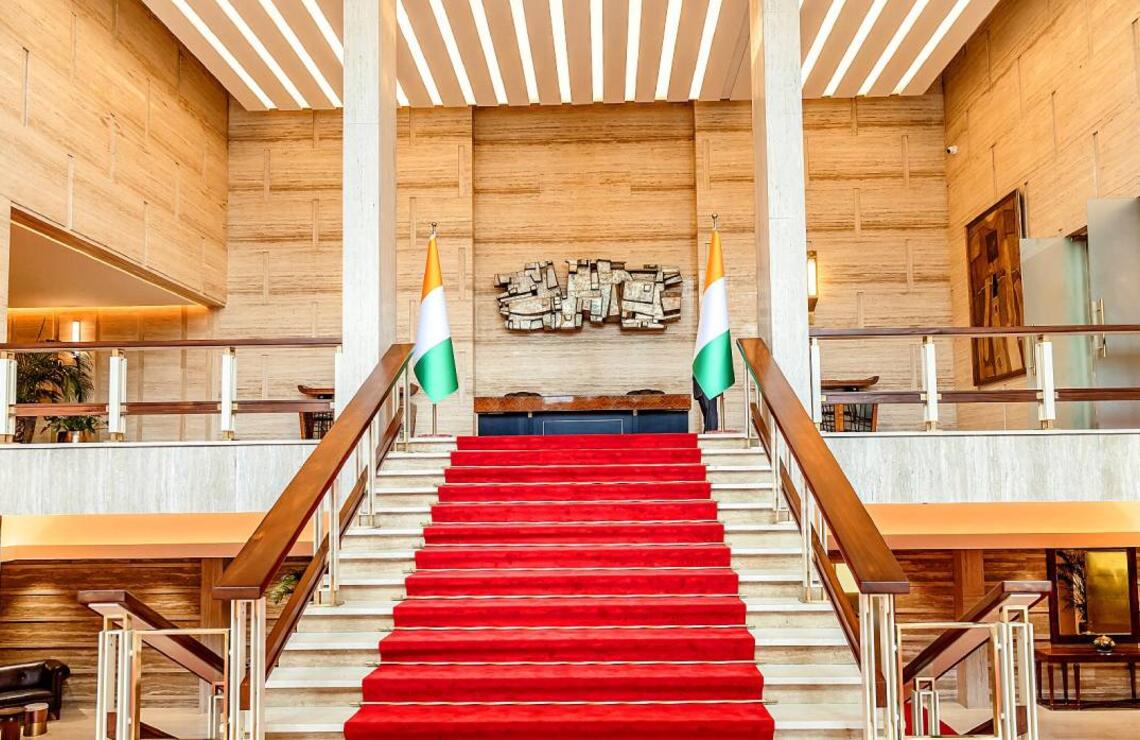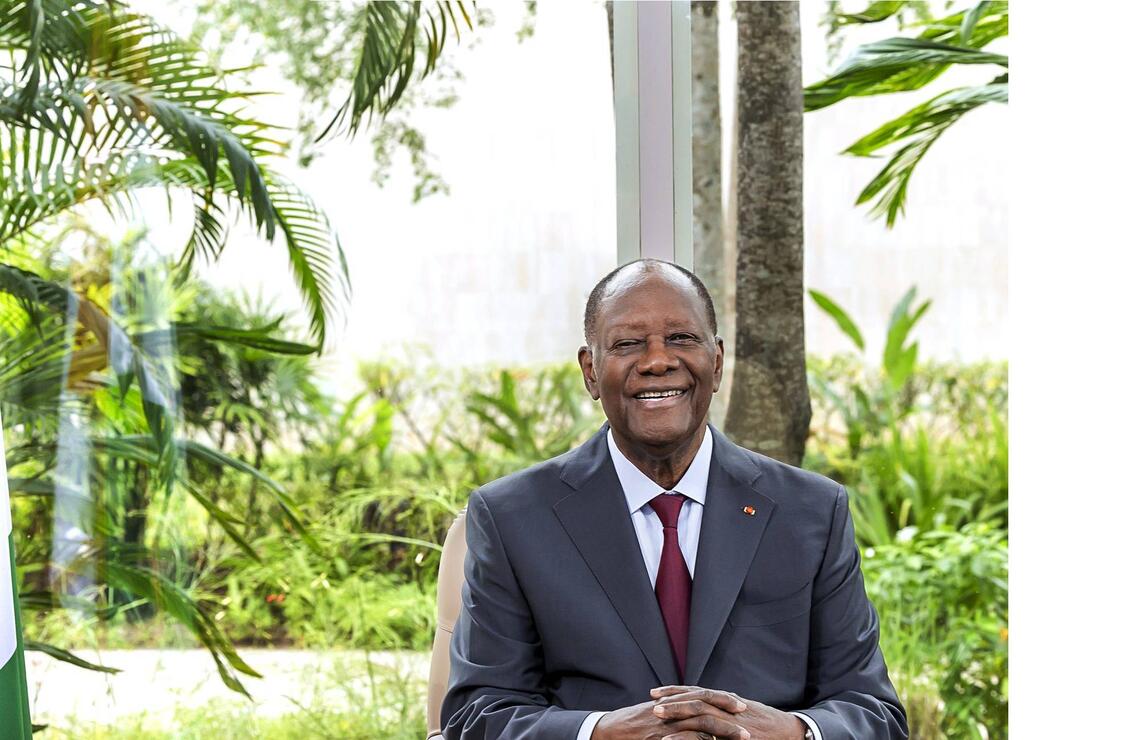
ADO's choice
“This is why, after careful consideration and in all conscience, I am announcing that I have decided to run in the presidential election on 25 October 2025 [...]. I am running because our country faces unprecedented security, economic and monetary challenges that require experienced leadership. Indeed, the terrorist threat is growing in the sub-region, and international economic uncertainties pose a risk to our country. This is a reality that no one can deny. It is a reality that I cannot ignore.”
It is 29 July, and Alassane Ouattara has finally ended the suspense. He will run for another term. The decision was expected. To be honest, there was no sign of a real successor emerging or being endorsed at this stage. ADO remains at the centre of the equation. Doubts, possible divisions or internal ambitions fade in the face of the leader's stature. The majority remains united, and seems relieved.
The president is realistic. He acknowledges his age and understands that four terms is a long time. He is aware that he will face criticism for his longevity. He certainly enjoys power and the ability to influence events and people's lives. Above all, he feels needed. He feels responsible and capable. He wants to protect the country from dangers and threats. He also has a constant desire to make his mark. To have implemented a truly African model of emergence, to have achieved results. It’s a legacy deserving of protection and strengthening.

Of course, his record will be the subject of much discussion in the coming weeks. After all, it's important to remember how far we've come. When Alassane Dramane Ouattara (ADO) came to power in 2011, Côte d'Ivoire was emerging from a long cycle of crises that began with the death of Félix Houphouët-Boigny, the founder of independence, in December 1993, and was fuelled by the propagation of the poisonous ideology of Ivoirité (a controversial, identity-based concept). The country was drained and ruined. Today, Côte d'Ivoire is one of the top ten African economies. Over the last fifteen years, the country has enjoyed one of the most sustained growth rates in the world (7% on average). This growth has been supported by massive investment in transport, energy, education and health infrastructure. Abidjan is positioning itself as a major metropolis with access to the open sea. The nation is credible on international markets, the Ivorian signature carries weight, Côte d'Ivoire remains the world's leading producer of cocoa, an agricultural powerhouse, and is involved in the production of oil and gas, as well as gold. Yes, there are still inequalities, and persistent poverty, but in terms of percentage of the population, it has never been lower. And the HDI indicator showed a clear improvement in 2024.
Then there's that rare and precious ‘luxury’ of peace and normality. A stable country with a population of over 30 million, lying between the Sahel and the Atlantic Ocean, a nation largely reconciled with itself, with its multiple identities. Where you can move around freely. Day and night. Invest. Study at a university far from the economic capital. This normality and economic progress are accentuating social mixing and intermingling. Despite ethnic differences, the idea of a ‘Côte d'Ivoire nation’ is gaining ground. There is a desire for unity in diversity, to do everything possible to avoid falling back into the tragedies of division. To overcome what must be overcome, to protect what must be protected. In this Côte d'Ivoire, young in terms of its history and population (75% of the population is under 35), there is a dual legacy: that of divisions that are receding, and that of a great national ambition that is being built. The transition is complex. The Africa Cup of Nations (February 2024) was a true moment of collective success and ambition that demonstrated the strength of this attachment to a common national narrative.
Over the past 15 years, few African countries can claim to have experienced such a positive, dynamic and creative trajectory. As the prestigious British weekly The Economist pointed out: ‘It is Africa's best kept secret.’
The electoral cycle is beginning. The president dominates the scene. He is a statesman, his team is united, his lieutenants are prepared. There will indeed be a ‘campaign’. Tidjane Thiam, the leader of the PDCI, and former president Laurent Gbagbo will not be running. They have been excluded, along with others, for legal reasons. However, it's hard to imagine them not speaking out, not contesting a process from which they are excluded, not openly criticising the record and the outlook. Other legitimate candidates will be there, determined to win votes, position themselves for the future and negotiate their place on the country's political chessboard. The election will not be purely a competitive contest. The country has changed. The last legislative elections (March 2021) and municipal elections (September 2023) were open and transparent. The media and civil society have gained ground. Voters, young and old alike, will demand a debate. It will take place in the press, in the audiovisual media, on international channels, in the maquis and upmarket restaurants, in Abidjan and in the provinces. It will take place in Côte d'Ivoire and outside Côte d'Ivoire, particularly with the diaspora. One way or another, the future will be at the heart of concerns and dialogue.
The issues at stake go way beyond personal destinies. Progress and development are not irreversible achievements. The Ivorian population is likely to reach nearly 50 million by the end of the half-century. Immigration remains a major concern in the north of the country. Security imposes heavy financial and organisational constraints on the nation. The effects of climate change could disrupt future patterns of growth, food sovereignty and the cultivation of cocoa, the country's main crop. In an unstable global context, it's vital to continue to grow, transform and modernise the economy, increase productivity, industrialise sectors, create new jobs, guarantee food sovereignty, support the private sector, invest and attract capital to accelerate the pace of change. It will also be necessary to adapt to new technologies and not remain on the periphery of the digital world.
Inclusiveness will remain a political and societal priority. More wealth will be needed to enable better distribution, lift all Ivorians out of precarity and clearly establish the country on a path to sustainable emergence. With a quantifiable first stage. Today, despite the renaissance of the last decade, Côte d'Ivoire remains a lower-middle-income country. The goal for 2030 will be to move into the upper-middle-income bracket, with an average per capita income of over $4,000 and a poverty rate of around 20%.
This will require significant effort. It will demand the mobilisation of the ‘country's driving forces’, to use a not-so-dated expression. The president has experience. The economy, social issues and security will remain major challenges. But politics will return to the centre of the equation. The younger generations need to be involved, to embrace the model and the discourse. They also need to participate in decision-making. This is the challenge facing Côte d'Ivoire's forty- and fifty-somethings. The president is also realistic. He knows that action must be taken to pave the way for this generational change. He reiterated this in his speech on 29 July.
The process will be complex. Succession doesn't just happen... The transfer of power is clearly a question of ambition, individual destinies, skills and... luck. But above all, it has to be part of a collective process of democratic and institutional maturity. Economic, social and societal modernity calls for political modernity. More than ever, it will be necessary to invest in institutions, promote essential dialogue, the collective and openness. More than ever, it will be necessary to avoid conflicts of ambition and move beyond regional or religious references.
Adapting, protecting, transforming the economy, and looking to the future... The forthcoming term of office for ADO and Côte d'Ivoire will be truly decisive. In the aftermath of October's election, the 'child of Kong', the fifth President of the Ivorian Republic, the man who will have set the country on the path to real development, will have a major, historic responsibility in his hands. That of creating the conditions for the sustainability of the Ivorian model, of creating the conditions for the handover of power, of opening up the prospects for tomorrow.